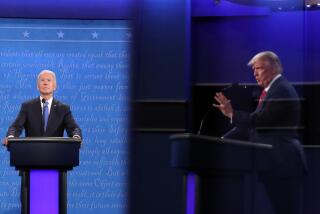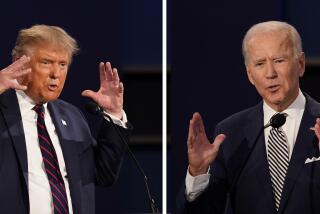Clinton, Gingrich Discuss Possible Faceoff : Politics: Aides to the President, House Speaker try to arrange joint public appearance Sunday in New Hampshire. Each side sees advantages, liabilities.
- Share via
NASHUA, N.H. — Aides to President Clinton and House Speaker Newt Gingrich were trying to reach agreement Friday night on an extraordinary joint appearance by the two in New Hampshire on Sunday that would represent a high-risk, high-gain venture for both men.
At a news conference here as he started a four-day journey through the Granite State, Gingrich sought to put the contemplated meeting on a lofty and bipartisan plane. “It’s not a political event,” Gingrich said. “I’m the Speaker of the House, he is President of the United States and we want to talk for a while about what we want to do together.”
But that bland description belied the political tension inherent in any face-to-face encounter between the Democratic chief executive, struggling to recover from last November’s midterm election disaster, and his principal political adversary, the GOP legislator who is striving to consolidate and expand his early legislative triumphs on Capitol Hill.
Gingrich set in motion the discussions that may lead to the joint appearance shortly after he arrived at Manchester Airport on Friday afternoon. In comments to reporters, he seized upon an apparently offhand reference by Clinton that appeared in a news story about what he and Gingrich might do in this state if they were together on Sunday.
Clinton was already scheduled to be in the state then to address the Dartmouth College commencement in Hanover and to talk to a senior citizens group on Medicare in nearby Claremont.
“I was very appreciative . . . when the President proposed that we have a discussion while we are up here together,” Gingrich said.
*
“I would not want to do a debate,” he added. “This is not a campaign year and I am not a candidate. But to have one of the leaders of the legislative branch and the leader of the executive branch to have a dialogue would be a terrific thing to do.”
As they mulled a response to Gingrich on Friday, White House officials said there was concern about giving the leader of the congressional opposition and a potential presidential rival the stature of a joint appearance with the President. But they also insisted that Clinton could easily handle anything the Georgia Republican threw at him.
“He’s good at this stuff and he likes it,” one aide said.
Clinton also had to weigh the cost of appearing to duck a confrontation with the most articulate spokesman for the competing Republican view of the role of government.
The joint appearance would assume even greater potential for dramatic impact by being staged here in New Hampshire, the site of the nation’s first presidential primary and a state celebrated as the creator and breaker of political ambition.
For Clinton, a faceoff with Gingrich carries with it the potential advantage of elevating in prominence the Republican who many Democrats view as the clearest symbol of what they regard as GOP ideological extremism combined with personal abrasiveness--and as such their best chance of winning the 1996 elections.
But by putting Gingrich on the spot, Clinton would also be giving him the chance to shine--at Clinton’s expense--before what would certainly be a huge national audience, thus giving an unwanted boost to Gingrich’s fortunes.
As for Gingrich, a joint appearance with Clinton, even one the Speaker insisted on describing as “a dialogue” rather than a debate, provides an opportunity for substantially enhancing his own prestige. Gingrich could gain not only at Clinton’s expense, but also at that of other leaders of his own party, notably Kansas Sen. Bob Dole, the Senate majority leader and GOP front-runner in the 1996 presidential race.
On the other hand, if Clinton were to successfully depict Gingrich as the insensitive extremist many Democrats believe him to be, the Speaker would suffer a severe setback.
By early Friday night, the compromise struck by Clinton and his advisers was to offer Gingrich a seat with the President at a previously scheduled town meeting and picnic Sunday at a senior citizens center in the southwest New Hampshire town of Claremont.
The seniors group has already been vetted to be friendly to the President, who has repeatedly promised older voters that he would fight to preserve their Medicare and Social Security benefits against the budget-slashing zeal of the Gingrich-led Republicans.
“The ball’s in Newt’s court,” a White House aide said. “Let him come up there and tell the old folks what he’s going to do with their Medicare.”
But Gingrich had no intention of being backed into such a corner. “I think it’s absurd to suggest that because you’re a senior citizen in America the only thing you care about is Medicare and Medicaid,” he said at his news conference, which preceded an address to the local chamber of commerce in which he outlined a clutch of economic and social proposals aimed at forging “a more dynamic, more prosperous America.”
“I think senior citizens care as much about whether their children or grandchildren wind up in Bosnia as any other age group,” Gingrich added. “I would like [his session with Clinton] to be a broad-ranging, open dialogue.”
Even if the joint session with Clinton does not materialize, the New Hampshire trip looms as a characteristically bold gamble for the House Speaker. If all goes according to plan, he stands to build momentum behind his cherished “contract with America,” and, incidentally or not, to nurture his prospects for running for President himself.
But if, as has sometimes happened in the past, Gingrich appears to overplay his hand during the endless stream of public utterances on his schedule, he could further darken the already notable blemishes on his public image, strain his critical rapport with his GOP cadres in the House and increase the vulnerability of his own party to Democratic attack.
Gingrich so far has commanded the near lock-step loyalty of House Republicans because of his effectiveness as a political and ideological paladin. “At this point he is very much understood to be the one who made them the majority and is leading their fight,” said Jeffrey A. Eisenach, head of the Progress and Freedom Foundation and a Gingrich adviser. “But there is a tension between offering yourself as an attractive symbol for the larger Republican agenda and appearing to elevate your personal advancement above the advancement of party.”
The danger for Gingrich on this trip, as well as a 25-city book promotional tour he will undertake subsequently, is that his tendency to shoot from the hip and to seem as if he has answers to every problem could carry him over that crucial line.
That is just what Democrats are hoping. “Newt Gingrich becoming Speaker after the 1994 elections makes it more conceivable that Bill Clinton can win in 1996,” argues former Democratic Rep. David Price of North Carolina.
Polling results tend to support such reasoning. A Times Mirror poll released in March showed that while many Americans gave Gingrich high marks for his job performance as ramrod of the Republican counterrevolution, many have misgivings about his character and a majority view him as an extremist.
Times staff writers John M. Broder in Washington and Janet Hook in Nashua contributed to this story.
More to Read
Sign up for Essential California
The most important California stories and recommendations in your inbox every morning.
You may occasionally receive promotional content from the Los Angeles Times.













